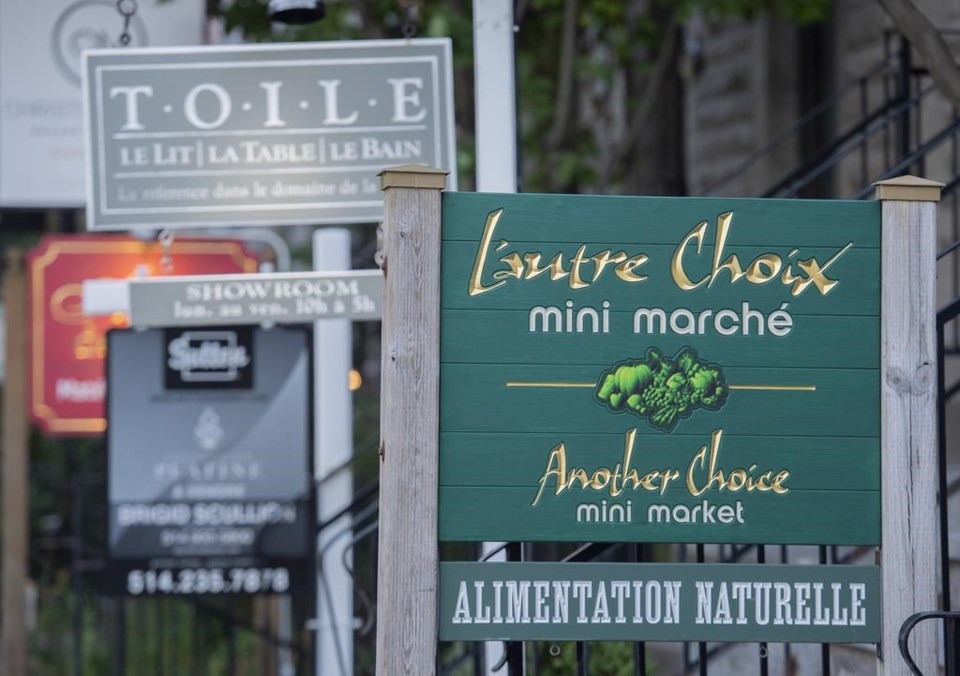MONTREAL — All the Quebec municipalities that were at risk of losing their bilingual status under a provincial language law have opted to maintain their right to serve people in both English and French, the province's language office confirmed.
The Office québécois de la langue française says all 48 cities, towns or boroughs that were notified their status could be revoked have taken the necessary action to remain bilingual.
"Thanks to this legislative amendment, the recognized municipalities that received notices had to analyze the need to maintain or not their bilingual status and thus to take a position," the language office said late Monday in a statement.
Under Quebec's new language law, Bill 96, municipalities could lose the right to communicate with residents in English if less than 50 per cent of the population has English as a mother tongue.
However, the law allows cities already recognized as bilingual to preserve their status — even if their anglophone population drops below 50 per cent — by passing a resolution within 120 days of receiving notice from the province.
More than half of the province's 89 bilingual municipalities received those notices in December because their English-language populations ranged from less than 10 per cent to just under 50 per cent. All 48 passed the resolution, the language office said.
A spokesman for French Language Minister Jean-François Roberge said the law strikes a balance between promoting French and preserving the rights of the English-speaking minority. "It will now be up to the mayors to justify this choice to their voters," Thomas Verville said in a statement.
Bill 96, which came into effect last June, tightened the province's language laws and affirmed that French is Quebec's only official language and the common language of the Quebec nation. However, the idea of giving up the right to serve residents in English was not popular with mayors.
Even Otterburn Park, a town 40 kilometres east of Montreal, elected to keep its status despite having only 7.2 per cent of its citizens with English as a mother tongue.
Scott Pearce, who represents mayors of bilingual towns at Quebec's federation of municipalities, said he wasn't at all surprised by the unanimous decision to remain bilingual. "It wasn't controversial in any of the places that I've spoken to," he said in a phone interview.
Pearce said the choice to remain bilingual is often done out of respect for the history of an area, as well as for English-speaking taxpayers, many of whom are older.
Municipalities that received notices are mostly located near the border with Ontario, in Montreal's West Island or in the Laurentians and Eastern Townships areas, all of which have historically had large English-speaking populations.
Pearce is mayor of the township of Gore, north of Montreal, which was founded by Irish immigrants. While the English-speaking population there has fallen to around 20 per cent, he said there was no question of letting the status lapse.
He believes most of the fears around the decline of the French language are centred in Montreal, where the proportion of people who speak French at home and work has been dropping.
"In rural areas like mine, (language) isn't an issue" he said. Almost all of the younger generation speak both languages, and he sees no animosity between English and French speakers.
While it's imperative that people be able to get service in French, he said it's useful for the municipality to be able to communicate with people in the language they understand best when it comes to complex issues, such as water quality and lake protection. Bilingual status allows a municipality to use both French and English in their written and oral communications as well as on their signage.
The process of revoking or renewing status is to take place every five years, after each census.
While all towns chose to remain bilingual this time around, the language office said there were also benefits for French-language services. "The discussions surrounding this exercise also led other municipalities to examine their practices in order to ensure that they communicate in French with the public," it wrote.
This report by The Canadian Press was first published May 16, 2023.
Morgan Lowrie, The Canadian Press



